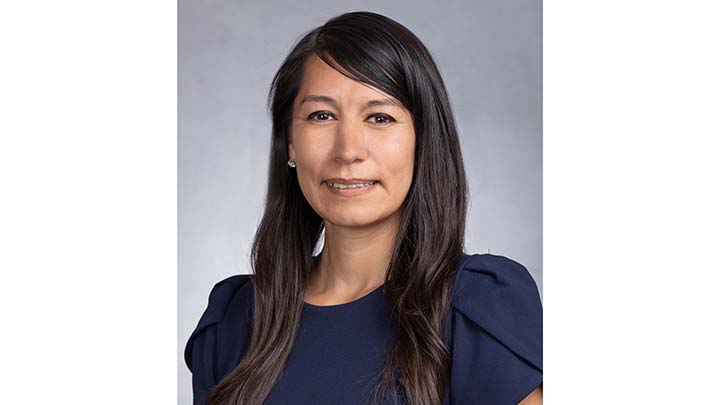Biologist draws foundation grant to advance infectious disease research
The Prebys Foundation awarded $500,000 to Angelica Riestra to support her work on a common sexually transmitted infection.

The San Diego-based Prebys Foundation awarded a $500,000 Research Heroes grant to San Diego State University cell biologist Angelica Riestra, whose lab studies one of the world’s most common sexually transmitted infections and the parasite that causes it.
Trichomoniasis is associated with several severe health conditions and disparities, including an increased risk of contracting and transmitting HIV. Riestra has been studying the infection since her days as a graduate student at the University of California, Los Angeles.
The philanthropic support from the Prebys Foundation represents “a critical award as an early-stage investigator,“ Riestra said in an interview. “It’ll give us an ability to really catalyze the projects that we have going and bring them to fruition with publications and more grant applications.”
The Prebys Research Heroes grant is intended to support research opportunities for women and underrepresented groups; Riestra applied to SDSU for its nomination. She was selected for the award in December and was publicly announced with 13 other recipients from San Diego institutions on April 30. All are receiving $500,000 over two years.
Riestra started at SDSU as a guest lecturer during her postdoctoral training in the NIH/NIGMS-funded University of California San Diego IRACDA program. She joined the faculty in 2020, setting up her lab on the top floor of the Donald P. Shiley BioScience Center just as the COVID-19 pandemic forced an upheaval in normal campus operations. Assembling the equipment she needed and recruiting students to work in the lab, she said, both proved more challenging than what she had been trained for.
There are nearly seven million trichomoniasis cases annually in the U.S. and an estimated 156 million cases worldwide, with women far more likely to show symptoms and a higher prevalence among Black women and women from lower socioeconomic backgrounds.
“I was really captivated by the parasite,” Riestra said. “There’s a lot that's not known about how it causes disease. So that really attracted me to try to put efforts toward that.”
It’s an important area of biomedical study, she said, because pregnant women carrying the infection have an increased risk of premature birth and giving birth to low birth weight infants. It’s also associated with cervical cancer and aggressive prostate cancer.
In her lab, Riestra is assisted by eight students of all university levels, mostly cell and molecular biology majors. The Prebys Foundation grant, Riestra said, will help with pioneering new “molecular tools to manipulate the parasite … as we investigate different microbiological and cell biology questions.”
For example, as part of their work, they hope to edit the genome of the Trichomonas vaginalis parasite using newer generation CRISPR-Cas technology.
Impactful research
Because the grant is unrestricted, “it really gives us intellectual freedom to pursue our most impactful research questions,” she added, including those “which may be in its infancy stage.” Along with future grant mechanisms, the support “really helps us to build that foundation. … You go where the research takes you.”
That means taking the work into areas with “a little bit of higher risk, but higher reward,” Riestra said.
Grants for faculty engaged in research speak to SDSU’s institutional goals of attracting talent, enhancing infrastructure, supporting graduate education, and achieving a Research 1 classification, for “Very High Research Spending and Doctorate Production,” from the Carnegie Classification of Institutions of Higher Education in 2025.
“The Prebys Foundation's steadfast support empowers our university to continue pioneering advancements and nurturing the next generation of leaders,” said Adrienne Vargas, SDSU vice president for University Relations and Development. “We express our gratitude to the foundation for recognizing how to create a meaningful impact.”
Jeff Roberts, dean of the College of Sciences, said Riestra “has launched an innovative and compelling research program.”
“Scientists often choose problems not just because the problems are difficult or fashionable, but also because they engage deeply felt personal values,” Roberts said. “Dr. Riestra's decision to study trichomoniasis is a testament both to her courage as a scientist and to the importance of recruiting a diverse workforce to the biomedical sciences.”
He added: “The funding associated with the Prebys Research Heroes Award will go a long way to addressing Dr. Riestra's funding needs and to supporting her students. The award will also allow her to focus on an important problem without regard to its ‘fundability.’ History shows that the most dramatic scientific progress is often made when scientists are free to pursue their own interests.”
The Prebys Foundation is among SDSU’s most impactful philanthropic sources, having contributed to a second stage in the Performing Arts District and the master of social work program, among other gifts. Prior to his death, foundation namesake Conrad Prebys gifted $20 million to SDSU to support scholarships, recognized in the naming of the Conrad Prebys Aztec Student Union.
To learn more about making a gift to support faculty research, contact Mary Darling, [email protected].



